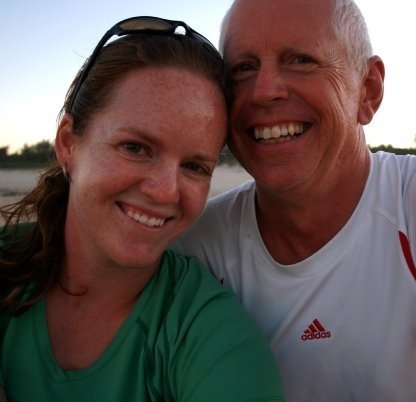One minor detail is that you have to pay the resort in cash, so we needed to make a trip into town to pay the bank machine a visit. We were going to go anyway, since the area we were staying at is completely removed from "downtown" Nadi. So we hopped on a local bus headed that way, paid our 70 cent fare and grabbed a seat on the rickety open air bus. Along the 10km of road to town, there were quick glimpses across the sugar cane fields to the jagged green mountains toward the interior. Hopefully we'll get a chance to go up there before we leave. Random shops sprung up along the road - auto repair places, butchers, and even a McDonalds with the standard little golden arches sign at the entrance that read 'bula'! Town was basically a main road extending for a dozen blocks or so, but the bus stopped at the busy bus station a few blocks away. Getting our first glimpses of the Fijian people, it was interesting to people watch and observe their demeanor, their appearance, and their language. Indigenous Fijians seemed to have medium brown skin with large rounded features (especially the large 'features' of many of the women) with crazy black afro hair that often approached Ronald McDonald-like in roundness! The other half of the local population is Indo-Fijian, tracing back to the farmers brought from India decades ago. They look very much like native Indians, with medium dark skin, straight black hair, and thin, defined features. Most of the Indo-Fijian women wore saris, and the shops on the main street were dominated by sari shops and curry joints.

With almost three hours before the bus would make a return trip, we ran a few errands and then spent the rest of the time wandering, browsing, and lunching in some much-needed air conditioning. We're back to southeast Asia type weather, with hot sun and high humidity. Other than a colourful Indian temple, a lively produce market, and a few cheesy souvenir shops, downtown Nadi wasn't overly impressive, though it was interesting to see people buying bundles of kava root (made into Fiji's famous narcotic drink) and going about their daily business. Many people on the streets were friendly, calling "bula!" to us as we walked by, but there were a few scammers too. One guy approached us, claiming to be a pastor who was collecting donations for flood victims. He had a good story and a really crappy photocopied "certificate" that he said the government issued to allow him to approach potential donors. When asked for the church's address so we could give a direct donation, he scrambled and said he didn't know it. Thanks but no thanks, buddy! He looked pretty mad when we walked away, probably because his plan usually works.
When the bus started filling up at 3pm, we realized that it doubles as the local school bus since tons of kids in school uniforms were getting on to head home. They were dropped off one by one at the driveways to their modest little houses as we left town, some with small farms of sugar cane or goats. As we neared the end of one street that ended at the beach, the bus stopped and simply shifted into low gear before driving straight onto the sand! It was like Fraser Island all over again! A minute later, he simply drove up onto the adjacent street that also ends at the beach, and carried on. Why turn around when you could drive on the beach I guess?!
The remainder of the afternoon was spent lounging by the beach and watching the local outrigger canoe club head out into the bay for a sunset paddle. We enjoyed some dinner while watching CNN playing on a tv in the restaurant, giving us a chance to catch up with the rest of the world. Pig flu, depressed economies, corporations going bankrupt... all great news as usual. It was interesting, though, to notice how many of the places around the world we have now been to that were mentioned: a special report on Khmer Rouge leader trials from Cambodia, tourism ads for southern Africa, news from Bangkok, and daily weather reports for cities like Cape Town, Ho Chi Minh City, Kuala Lumpur, Canberra, Sydney, and Jakarta. It really made us feel like we can relate to the rest of the world a little more easily now.








well Fiji is a lovely place but before 1987 coup it was far much better, things were rolling , sugar cane farming (major economy supporter) was back stabbed by Rum booka.
ReplyDeleteRabuka should be thrown in prison never to be released.
ReplyDelete